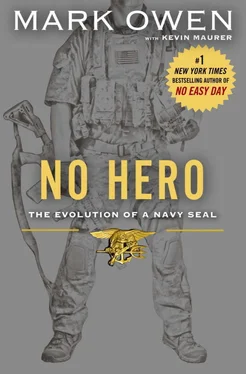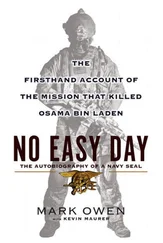“Fucking sweet, another armchair quarterback telling us what to do from miles away,” one of the team leaders said.
“Well, at least it’s not life or death,” I said with a smirk as I walked out of the room.
At that moment, any trust we had in the Ranger colonel was gone. He wasn’t listening to what we had to say. Any logical argument we made to wait and monitor the target for additional time was dismissed.
We gathered in the operations center to go over the plan one more time. Usually when we got missions, there was a little excitement. We joked that deployments were like minimum-security prison sentences because you were stuck in a camp and served the same shitty food that convicts ate back in the States, and you couldn’t leave the wire without orders. Anytime we got to leave the wire it was better than sitting around camp, even if it meant you could get shot.
When I got to the operations center for the final brief, it felt like a cloud hung over this mission. I figured at best this was a dry hole and a waste of time. At worst, it was a setup and we were headed into an ambush.
“OK, boys,” the troop chief said. “We’re going to land on the Y instead of patrolling to the compound. Our hope is that the noise will stir up some commotion inside the compound and we’ll actually be able to see some signs of life.”
“Landing on the Y” meant that we would take a helicopter in to a spot near the target, just outside of RPG range. Instead of landing outside of earshot and sneaking in, we were hoping that the noise of the helicopters would spook the people in the house, causing them to run.
Of course, even if we did detect movement, it didn’t mean there wasn’t a chance that the people on the target weren’t all wearing suicide vests. We weren’t too thrilled with the plan, but we didn’t have much choice.
“This is the world we live in, this is our job, and we’re going to do everything within our capabilities to make sure we do this right and that nobody gets hurt,” the troop chief said.
I’ve heard one of my SEAL mentors say that there are rules about bitching. He said everyone has the right to bitch about a mission or job for five minutes. After those five minutes, you shut the fuck up and get to work. We got the full five minutes before we rode out to the helicopters in two small buses.
I didn’t have time to dwell on the commander’s decision as the bus bounced along the gravel road leading to the flight line. I wasn’t thinking about the Ranger colonel. I wasn’t thinking about how I was pissed that he was making us do this and putting us in a shitty position. I simply tried to focus on my three-foot world. My job wasn’t to complain; my job was to clear that compound under the orders we were given. We could talk smack about the colonel’s bad decision once we survived the mission; get distracted by it now, and we might not.
I sat cradling my suppressed HK MP7 in my lap. On my side, I was carrying a cut-down M79 grenade launcher. Our armorers had cut the barrels down shorter, cut the butt stock down into a pistol grip, and attached small red dot sights on top for more accuracy. I would always carry the M79, or “pirate gun,” when I carried the lighter and less lethal MP7. If I had to engage any enemy past one hundred and fifty meters, I would have to use my M79.
All my gear was desert digital camouflage, or, as we call it, AOR1. My OCD tendencies required me to color coordinate everything. I’d learned my lesson with the parachute jump gone wrong years before. I’d been worried about bad-fitting gear and not focused on the jump. Tonight, all these years later, my gear felt like it was part of me. Tight, clean, streamlined.
Sitting across from me in the helicopter, the snipers had collapsible ladders at their feet. The ladders allowed them to climb the walls surrounding the compound and provide covering fire. Everything was set. We were ready. I just hoped as we landed that I’d hear reports from the drones flying overhead that they were seeing movement on the target.
I could hear the engines whine as we started to land. The ramp was already open as all of us anxiously waited for the helicopter to come to a stop. We jerked to a halt as the wheels touched down and settled into a huge cloud of dust. The troop chief and troop commander were both on the radio with the drone circling above.
“Negative movement,” I heard the troop chief say over the team net. “I repeat, no movement on target.”
Either the Taliban had learned some serious discipline or no one was home, I thought as I raced down the ramp.
My mind was pinging as I followed my teammates off the bird. I was ready for a fight. I half hoped and half expected to hear the familiar rattle of AK-47 fire or the whoosh of an RPG. Once I cleared the dust cloud from the helicopter’s rotors, I took a knee and waited.
We formed a large “L” around the compound and listened to the noise from the helicopter. There was nothing but silence as the last thump of the rotor faded. No one ran. There was no yelling. Everything we did was slow and methodical. There was no hurry.
Why rush to a gunfight or ambush?
There was little moonlight, but under our night vision goggles the area looked like a green moonscape. I could see the walls of the compound a couple hundred meters away. The ground was rutted, dry, and dusty. It didn’t look like any farmer had touched the field in a while. My eyes traced the compound’s wall to the corner and then tracked into the wood line nearby. We often found fighters in the trees, but none of the drones spotted anyone either before we arrived or after the helicopters departed. I half expected to find the fighters holed up outside waiting to ambush us as we hit the house. If this were a legit target, the al Qaeda commander’s bodyguards would definitely be nearby.
From above us, the drones still weren’t seeing any movement. The only activity was two heat sources—people, likely men—standing on a rooftop that was well over five hundred meters away. The men could have simply been innocent farmers awakened by the noise of our helicopters, or they could be spotters for a possible ambush.
I watched as our snipers out front slowly crept across the field toward the compound walls. They got to the base of the wall, extended their ladders, and climbed up into their overwatch positions. From the snipers’ vantage point, they could see inside the walls and cover us as we approached.
We held our position until one by one, all the snipers checked in over the radio. They all had the same report: “Negative movement in the compound.”
“Snipers, good copy,” I heard the troop chief say over the net. “Assault element, commence assault.”
I was part of the assault team and near the front of the formation. I could see Scott in front of me. Slowly, I started to move toward the compound. I picked my way over the loose dirt and massive rocks.
“Still no movement,” the troop chief said as he relayed information from the drones and snipers.
When I got to the wall, I followed my teammates around to the front of the compound. Scott got to the gate first. As I closed in behind him, I could see that the gate had actually been left open just a small amount, just enough to be inviting. The only thing missing at this point was the welcome mat laid out in front for us to wipe our feet on before we entered.
Scott searched around the gate for booby traps. He looked quickly around the courtyard to make sure no one was waiting and then slowly pushed the gate open a bit further, constantly scanning the courtyard.
There was no reason for talking, let alone some crazy commando hand and arm signals. We’d all worked together for so long, we knew Scott was working his magic, and when he was ready he would let us know. He finally waved us forward and we lightly stepped over the doorjamb and into the compound.
Читать дальше










